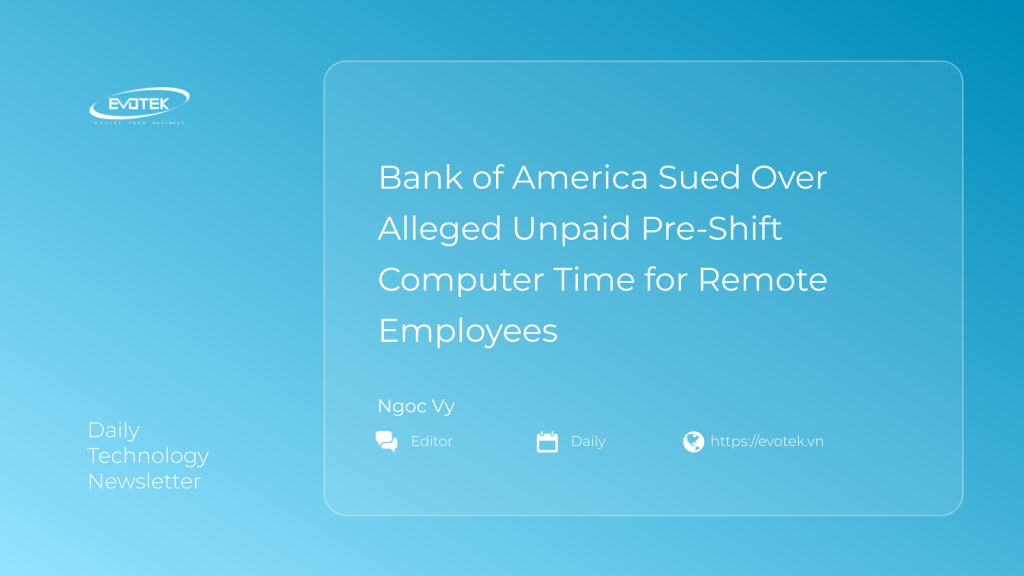Bank of America is at the center of a new class-action lawsuit, accused of systematically failing to compensate hundreds of hourly remote employees for significant pre-shift computer setup and log-in time. Filed in federal court on October 23, the suit by former Business Analyst Tava Martin claims workers routinely performed 15 to 30 minutes of unpaid work daily before their official shifts began.
According to the filing in the United States District Court for the Western District of North Carolina, employees were required to navigate a complex digital gauntlet before their paid hours commenced. This included booting up systems, requesting security tokens via personal phones, logging into virtual private networks (VPNs), accessing multiple web applications with separate passwords, and downloading essential spreadsheets. Only after completing these critical steps could they commence their primary duties, such as taking calls from business customers about regulatory reporting requirements.
The lawsuit highlights a strict “phone ready” policy at Bank of America, which mandated employees be immediately available for calls at the start of their shift. This policy, combined with the lengthy boot-up process, allegedly forced workers to perform crucial startup tasks off-the-clock to avoid performance penalties, disciplinary action, or even termination.
The allegations extend beyond pre-shift preparations. Many systems would automatically disconnect or lose connection during unpaid lunch breaks, necessitating a partial or full re-login sequence. This process often consumed an estimated three to five minutes of uncompensated time daily, with complete reboots taking even longer. Post-shift duties, including securely logging out of all programs and shutting down computers, added another two to three minutes of unpaid work daily.
Tava Martin, who worked for Bank of America both remotely and at its Jacksonville facility, was employed through a third-party staffing agency but contends the bank dictated her work conditions, schedules, training, and employment terms. Earning $46.17 per hour, Martin, like many colleagues, regularly worked full-time hours. The lawsuit argues that this uncompensated time should have been paid at the overtime rate of one and a half times her regular wage, representing significant lost earnings.
For instance, the complaint cites the week of March 11-17, 2024, where Martin was paid for 40 regular hours but no overtime. With an estimated 20 minutes of unpaid pre-shift, meal-period, and post-shift time across five shifts, she was allegedly shorted 100 minutes, which should have been compensated at her overtime rate of $69.25 per hour. Similar calculations apply to numerous other pay periods detailed in the complaint.
The lawsuit references explicit 2008 guidance from the Department of Labor concerning call centers under the Fair Labor Standards Act (FLSA). This guidance clearly states that activities like starting computers and downloading work applications constitute compensable “first principal activity” of the day. It also mandates employers maintain accurate daily or weekly records of all hours worked, including time spent in pre- and post-shift activities.
The filing suggests Bank of America either overlooked its obligation to determine if this computer time was compensable or knowingly withheld payment. Notably, the lawsuit points out that the financial institution has faced factually similar cases from other employees regarding time spent loading and logging into computer systems.
Martin seeks to represent a class of all current and former remote hourly Business Analysts who worked for the bank within the three years preceding conditional certification through judgment. The lawsuit estimates this group could comprise hundreds, if not thousands, of individuals performing similar tasks using the same or comparable computer programs under identical timekeeping policies and strict schedules.
While the lawsuit is in its early stages, with no court ruling yet on its class-action status or the merits of the allegations, it underscores a growing focus on wage compliance for remote and hourly workers in the digital age.

 日本語
日本語 한국어
한국어 Tiếng Việt
Tiếng Việt 简体中文
简体中文